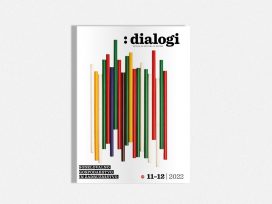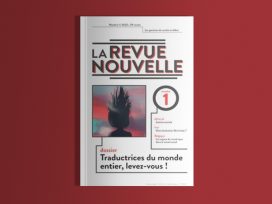The best ever
- Eurozine Review
5/2017
‘Blätter für deutsche und internationale Politik’ takes a leaf out of Kohl’s book; ‘Vagant’ reruns the Scandinavian experiment; ‘Dublin Review of Books’ suggests an Irish precedent for the Cyprus question; ‘Index on Censorship’ asks what 1917 means for freedom today; ‘Razpotja’ measures rhetoric against reality; ‘Merkur’ challenges middle-class aversion to party politics; ‘Ny Tid’ designs the best-ever utopia; ‘La Revue nouvelle’ understands algorithmocracy; ‘Dialogi’ looks at interculturalism in Slovene theatre; and ‘Ord&Bild’ suspects that Neanderthals were more easy-going.
Blätter (Germany) 7/2017

Without Helmut Kohl’s ‘will to power’, German reunification and European integration after ’89 would have been impossible, writes Albrecht von Lücke in Blätter. ‘When the opportunity arose, Kohl seized it, acting with enormous political acuity, instead of typically German pomposity. And while Kohl was literally bursting at the seams with creative joy at the historical chance, the Left, as so often in German history, was watching from the wings, mute and powerless.’
However Kohl also sets another example: ‘the necessity of using power not as an end in itself, but to attain a defined goal … Angela Merkel has yet to prove that her politics are really motivated by passion for the issues, in other words by genuine conviction in Europe – and not primarily by the blank desire to stay in power.’
Macron: Many on the French Left suspect Macron of authoritarianism. Indeed, writes Claus Leggewie, ‘it is quite unsettling how rapidly the thirty-nine year-old has internalized the rituals of power of the presidential monarchy, including the structures of the Fifth Republic itself, whose social-cultural foundations have long eroded and whose Right-Left polarity the newcomer dissects with such glee.’
However, the new directions struck by Macron in ecology, de-radicalization, anti-corruption, refugee policy and above all Europe give reason to believe that he will carry on the anti-totalitarian, liberal tradition of French ‘Second Left’. ‘The European Left’, writes Leggewie, ‘must now decide whether they want to be spectators to Macron’s putative failure, or whether they want to take part in the drive for a European declaration of independence.’
Womenomics: At the Woman-20 meeting in Berlin in April, Angela Merkel and Christine Lagarde discussed women’s economic empowerment with Ivanka Trump and Queen Máxima of the Netherlands. But are these women really the vanguard of feminism? According to Christa Wichterich, behind the ‘Yes, you can!’ rhetoric is a hard-nosed neoliberal ethos that cares nothing for genuine gender inequality.
More articles from Blätter in Eurozine; Blätter‘s website
Vagant (Norway) 1-2/2017
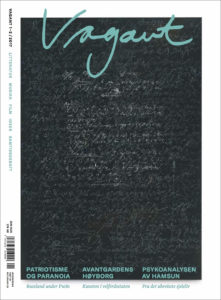
Vagant looks at how the arts, and avant-garde arts in particular, have fared as part of the ‘Scandinavian experiment’. Not to be confused with the combination of a generous welfare state and a free-market economy, the phrase refers to the attempt ‘to extend political democracy to the arts’ (as a 1960s definition has it). Scandinavia, explains Vagant editor Audun Lindholm, ‘is the world’s avant-garde society’. After fifty-odd years of socially progressive cultural policies, the next big project could be – should be – to channel energy and money into ‘new inter-Nordic high-quality media’.
Cultural policy: Espen Grønlie considers some awkward policy aims as artists are paid to be subversive and ‘dangerous’, as well as producing solid financial gains. Lenin, Grønlie points out, predicted the destruction of ‘bourgeois culture’ not by the agency of the revolution but by the diffusion of culture to the people at large. In Grønlie’s benign Scandinavian version, ‘cultural workers have enough to eat, high culture is available for those who care, and the people at large are flooded with entertainment’.
Welfare state: Millennial Danish writing, according to Tue Andersen Nexø, ‘reflects a welfare state in crisis.’ The notion that ‘contemporary misery is a direct result of the failures of the welfare state’ returns in Joni Hyvönen’s powerful analysis of the critic Mark Fisher, who also asked, challengingly: ‘To what extent should the state to interfere in the life of the individual? Should the mass of people be provided with everything they think is what they want?’
Norway’s trauma: Artist Thomas Kvam has drawn witty doodles in the margins of previously confidential transcripts of Knud Hamsun’s sessions with his psychoanalyst. There, displayed on the gallery walls, are fragments of the great writer’s dreams, reminiscences, and concerns about having dried up as a writer. ‘Everyone in Norway would dearly like to understand Hamsun, he is our great national trauma,’ says Kvam. ‘So, why aren’t his analyst’s notes available to the public?’
More articles from Vagant in Eurozine; Vagant‘s website
Dublin Review of Books (Ireland) June 2017

In Dublin Review of Books, John Swift has a fresh view on the half-a-century old Cyprus problem. Cyprus and Ireland, both small and divided island states, have a lot in common, he suggests. In both cases, division followed shortly after their armed struggle for independence, creating deep ethnic, national and political problems that seemed and still seem almost unsolvable. The Cyprus problem, however, seems more difficult and complex still, given its location and the relation of the two communities to their respective ‘motherlands’.
There are also many parallels in the language of conflict, notes Swift. Public and political discourse is painted in black and white terms: ‘victim and oppressor, liberty versus tyranny. Flags anthems, marches, commemorations and funerals … In Ireland then, as in Cyprus today, demonization of the other community, its leaders and allies, was very strong.’ This is the kind of thinking, Swift argues, that blocks any progress. He concludes that ‘the most important lesson from the Northern Ireland example may that peace is a process … and has to be worked at’.
1917–2017: Sean Sheehan begins a roundup of publications on the Russian Revolution by citing from Hayden White’s seminal Metahistory, now in its fortieth anniversary edition: ‘the documentary record does not figure forth an unambiguous image of the structure of events attested in them’. He analyses the numerous works by asking how historians have tackled this challenge – and how open they are about their efforts. Quoting Theodor Adorno, he argues that ‘there is a need to comprehend impossibility “for the sake of the possible”. The best of the centenary books recognise this as they each tell their own stories.’
Fairy tales: Éilís Ní Dhuibhne looks at the various ways in which the fairy tale genre is interpreted, concluding that fairy tales appeal because ‘they are meaningful in an elemental way. They recount, poetically and artistically, in a rich code of metaphors and symbols, the basic journey of human beings from childhood to adulthood.’
More articles from Dublin Review of Books in Eurozine; Dublin Review of Book‘s website
Index on Censorship (UK) Summer 2017

Marking ‘100 years on’, Index on Censorship asks what difference the Russian Revolution makes to our freedom today. The answer, in Russia at least, is a lot – and not in a good way, according to Andrey Arkhangelsky. He argues that ‘the Soviet ideal could exist only in a hermetically sealed, self-contained space. The situation was like in the fairy tale about an evil princess who ordered all mirrors to be removed from her palace in order not to see her pimple.’ The Soviet edifice may have crumbled, but its spirit persists in the form of Soviet Man, who to this day ‘finds the possibility of having a choice disturbing’.
Art and propaganda: B.G. Muhn detects real talent in the socialist realist-inspired art of North Korea: ‘I was totally stunned both by how art functions in the country and how good some of the work is.’ Muhn describes the ‘intense competition and years of training in order to be selected in a state-run studio’. Once artists have submitted their quota of official art, they can spend time on their own works. ‘Nevertheless, they stay within certain boundaries … In the 1960s a well-established oil painter made the mistake of expressing the leader’s image in a way that was deemed in appropriate and was forced to labour in a remote factory for 14 years.’
Censoring comedy: Silvia Nortes reports on the growing use of the law – including anti-terrorism statutes – to target satirists and comedians in Spain. She quotes Facu Díaz, a comedian prosecuted last year for posting jokes on Twitter: ‘The same court is judging jihadists and people that post jokes.’ For Díaz, police involvement in itself is matter of concern. ‘They don’t have experience in social media. It’s like giving a gun to a monkey.’
More articles from Index on Censorship in Eurozine; Index on Censorhip’s website
Razpotja (Slovenia) 28/2017
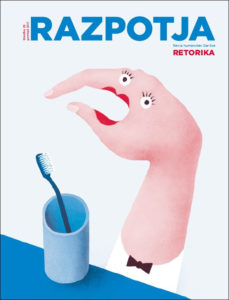
The latest issue of Razpotja is dedicated to rhetoric. Editor Luka Lisjak Gabrijelčič emphasizes the historical role of rhetoric in the classical ideal of the vivere civile, and laments that the post-modern interest in language neglected the humanist view that permutations of meaning must be studied in relation to truth. In order to counter the pitfalls of the ‘post-truth’ era, critical re-evaluations of the rhetorical tradition must insist on contrasting discourses with extra-textual reality.
Focus on rhetoric: Primož Turk presents the ancient Greek understanding of téchnē rhétorikē and Rok Plavčak extends this overview to the Enlightenment period, tracing the genealogy of postmodern relativism to the anti-Enlightenment reaction. Aljoša Kravanja depicts the figure of the internet troll as a contemporary, anarchic version of the agent provocateur, while Martin Hergouth and Blaž Kosovel analyze shifts in modern US political rhetoric.
Journalism since glasnost: Ilya Yablokov describes how the ethos of journalistic independence that flourished in the USSR during glasnost degenerated, in the following decades, into political partisanship. While critical journalism was tolerated and even encouraged by the reformists around Gorbachev, the prospect of a communist backslide at the start of Yeltsin’s second term forced journalists to abandon impartiality. The profession has never recovered, writes Yablokov.
Also: Peter Verovšek compares Trump’s travel ban to the ‘extreme vetting’ practices of the Cold War and warns that it could distort US foreign policy in a similar way; Francesco Condello writes about the ambiguities of Italy’s 5 Star Movement; Marc Barnes enjoys the film Rogue One, detecting the return to a transcendent understanding of the Force in the Star Wars saga; and statement in support of the CEU, including a short essay by Luka Lisjak Gabrijelčič on Miklós Vásárhelyi, who first proposed the idea for the university.
More articles from Razpotja in Eurozine; Razpotja’s website
Merkur (Germany) 7/2017
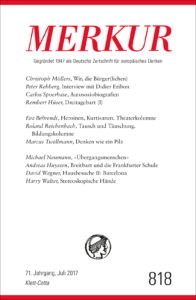
Without an apolitical middle class there would be no far-right resurgence, writes constitutional jurist Christoph Möllers in Merkur. ‘The middle class has got used to believing in a world without politics, or at least one in which politics neither offers them anything nor takes anything away.’ Faith in apolitical institutions – the civil service, the judiciary, the economic establishment – is seldom disappointed, he observes; and yet today, institutions supposedly immune from politics ‘are turning out to be highly dependent on the general political climate’.
Indeed, the ‘ubiquitous complaint about the incipient populism’ is compatible with middle-class ‘aversion to politics’. This is not to say that the middle classes would consider themselves apolitical. However is it enough to be informed, to vote in elections and to be socially engaged? According to Möllers, distrust in political parties (especially in Germany) as vehicles of oligarchic interests must be overcome. ‘Whoever believes that the existing order should be protected will have to get to know its political forms – and that means, above all, joining political parties and spending a significant amount of time in them.’
Didier Eribon: ‘The gap between the person I should have become and the person I am now is a wound that does not heal’ says Didier Eribon, author of the sociology bestseller Retour à Reims, in an interview with Peter Rehberg. He describes how, as a homosexual and a young Trotskyist, he felt discriminated against by the narrative of class struggle. Social causes such as the lesbian and gay movement had to ‘claim their own space against political organisations that concentrated only on class. I try to combine both.’
More articles from Merkur in Eurozine; Merkur’s website
Ny Tid (Finland) 6-7/2017
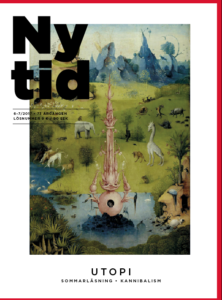
Criticism that Ny Tid is failing to think beyond neoliberalism prompts a barrage of utopias. Numerous contributors agree that a basic income is central to the post-neoliberal future. Economist Jan Otto Andersson, a pioneer of the concept of basic income, admits that while ‘the risk that it encourages passivity is exaggerated, it should nonetheless be taken seriously’. He proposes combining a ‘passive’ basic income with an ‘active’ participatory allowance that ‘would combine a minimum of economic security’ with voluntary activities that would ‘give us a sense of respect and dignity’.
Complementarity: Drawing on Niels Bohr’s theory of complementarity, microbiologist Kai Simons envisions a society combining the Nordic welfare state plus a basic income with the capitalist free market. This mix, he argues, would avoid the dual pitfalls of stagnation and inequality. ‘We need no revolution to realize the complementary society. It brings radical change, but the reforms can be implemented gradually.’
Ethical hedonism: ‘Imagine a perfect day, then think about how much of that day becomes problematic if you’re a leftist’, writes Otso Harju. ‘The Left asks people renounce the only ways they know to be happy, without providing new ones in return.’ The Left should embrace hedonism, while simultaneously acting according to sustainable and ethical principles. Instead of stoical suffering, it needs to dream of ‘the best ever’.
Social critique: Since Marx and Engels, visionary utopias merely create unsolvable problems, argues philosopher Arvi Särkelä. While we need a discourse about alternatives, it must be rooted in a critique of the here and now. ‘Successful social critique changes society, successful social change is always critical.’ When leftists focus on current realities, a vision is always inherent; claims that the Left ‘provides no alternatives’ are bogus.
More articles from Ny Tid in Eurozine; Ny Tid’s website
La Revue nouvelle (Belgium) 4/2017
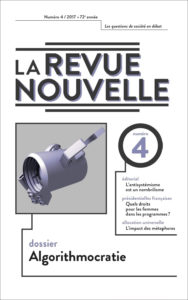
In La Revue nouvelle, Christophe Degryse explores ‘the hidden face of the technological honeymoon’. The ‘fourth industrial revolution’, he argues, brings new risks. The possibilities in an economy based on sharing are one thing; but ‘as robots become intelligent and develop motor skills, we are entitled to start asking “who is operating who?”’
Indeed, 47 per cent of jobs are threatened by automation in the US alone. New digital platforms push productivity while depressing wages and the value of work, ultimately leading to severe polarization and the collapse of the middle class, as the flip side of the benefits of the ‘anytime, anywhere’ culture. Turning back the clock is not an option, but a debate about the direction in which we are headed is urgently needed, to avoid ‘liberty for some and servitude for others’.
The limits of digitization: José Halloy contrasts the efficiency achieved by miniaturization – ‘the number of transistors that can be fitted in a circuit has doubled every year since the early 1970s’ – with the crippling expense of the extraction of the raw materials required. We now have mini-computers in every aspect of our lives – smartphones, laptops, TVs, radios, music players – and have reached the stage where further advances in physics would be required to take miniaturization any further.
‘As regards the sustainability of technology, energy efficiency isn’t enough’: we should not be blinded to the undesirable, even counterproductive aspect of the global increase in energy consumption that our progress has led to. With 1.4 billion smartphones sold between 2007 and 2015, ‘current computer technologies are not sustainable in the long term’. In the twenty-first century, we are reaching a crossroads that will require extensive and urgent research to develop alternative solutions: we desperately need ‘to reinvent the way we build electrical systems, including computers and robots, if we are to make them sustainable’.
More articles from La Revue nouvelle in Eurozine; La Revue nouvelle’s website
Dialogi (Slovenia) 3-4/2017
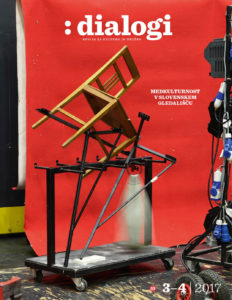
Boris Vezjak’s editorial in the latest issue of Dialogi reflects on sexism in Slovenia’s domestic media. In one flagrant case, a well-known intellectual cited pseudoscientific conspiracy theories and sub-Freudian psychology to argue that Slovenia’s high position in global gender equality tables was proof of the country’s ‘de-masculinization’. Vezjak laments the muted public response: ‘The media, academics and civil society, through their silence and direct aiding and abetting, are creating conditions in which sexism manages to survive.’
Theatre: Turning to a more inspiring view of culture in the Julian Alps, much of this issue of Dialogi is devoted to theatre. A thematic section guest-edited by Barbara Orel, entitled Interculturalism in Slovenian Theatre, looks at how contact with other cultures has influenced Slovenian theatre. Ana Obreza writes about the interconnectedness of cultures on the stage of the Slovenian Permanent Theatre in Trieste; Katarina Košir surveys Roma theatre activity in Slovenia; Anja Rošker sees Ivo Svetina’s Scheherazade (1989) as a milestone in the dialogue with the theatre cultures of the Far East and as a Slovenian parallel to Peter Brook’s famous staging of The Mahabharata; and Rosana Hribar investigates how dancer Maša Kagao Knez is developing Afro-modern dance.
Reviews: In Dialogi’s Cultural Diagnosis section, Matic Majcen analyzes Jim Jarmusch’s latest film Paterson as a commentary on the state of the arts today; and Žiga Brdnik links the film Split, by American director M. Night Shyamalan, with the scattered identity feelings of younger generations.
More articles from Dialogi in Eurozine; Dialogi’s website
Ord&Bild (Sweden) 2-3/2017
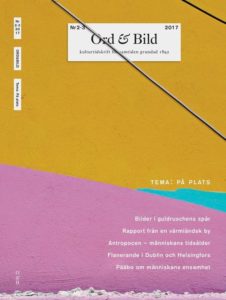
In an issue of Ord&Bild on the impact of place and location on personal life and social culture, Håkan Lindgren talks to Swedish evolutionary biologist Svante Pääbo, one of the founders of paleogenetics. In 1997, Pääbo and his team cracked the Neanderthal genetic code and in 2009 could show that there was probably interbreeding between Neanderthals and humans, which means that as much of two per cent of our DNA could be Neanderthal.
However, as opposed to humans, Neanderthals were not very adventurous. All objects found at a Neanderthal settlement came from less than two kilometres away – while humans very early developed trade with other groups and travelled far. It might be difficult for a member of the notoriously dissatisfied species Homo sapiens to even contemplate the possibility, but could it be that the Neanderthals were simply satisfied with what they had?
‘Yes,’ answers Pääbo, ‘that’s certainly possible. What strikes me is that of all the human forms that existed over the last two million years, it is only modern man who systematically starts to cross waters with no visible land on the other side. There are always some nutcases who want to go sailing and become famous or discover something. And it never ends. We’ve discovered everything on this planet, so now we need to go to the Moon, to Mars.’
Anthropocene: Reviewing Sverker Sörlin’s new book on the Anthropocene, Hjalmar Falk finds Sörlin’s human science perspective highly commendable: ‘The concept of the Anthropocene problematizes the same divide between nature and culture that underlies the division of the sciences into natural and human. Where do you draw the line between geological and anthropological formations, in an age when human creations put deep and eternal marks on the system of the planet?’
More articles from Ord&Bild in Eurozine; Ord&Bild’s website
The Eurozine Review presents a selection of the latest issues of Eurozine partner journals, summarizing their contents in English as a way of encouraging cultural and political dialogue between national public spheres in Europe.

Published 7 July 2017
Original in English
First published by Eurozine
Newsletter
Subscribe to know what’s worth thinking about.


